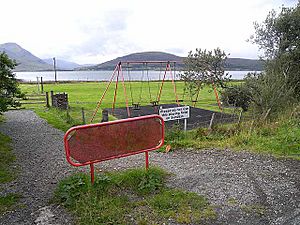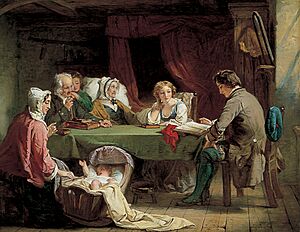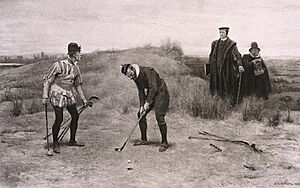Puritan Sabbatarianism facts for kids
Puritan Sabbatarianism is a way of observing Sunday, which Christians call the Lord's Day. It means dedicating the entire day to worship and avoiding most other activities, especially fun or relaxing ones.
Unlike some groups who observe Saturday as their holy day, Puritans observed Sunday. They called it the Lord's Day or the Christian Sabbath. This idea, often found in the Westminster Confession of Faith, is different from how some Christians in Europe observed Sunday. Those in Europe, following ideas like the Heidelberg Catechism, focused on rest and worship but didn't forbid all fun activities. However, many early Christian leaders, including John Calvin, believed that Christians should avoid both work and recreation on Sunday to focus completely on worship. By the 1600s, many Christian thinkers in both Britain and Europe agreed that the whole Sabbath should be used for worship.
How it Started
Even before the Puritans, leaders like John Calvin believed that Christians should stop working and having fun on Sunday. This was so they could spend the whole day worshipping God. In Geneva, where Calvin lived, officials would even question people who were seen working or playing sports like tennis or bowling on Sundays. They thought these activities were not right for a day meant for spiritual rest.
Over time, a key idea developed among Protestants: that church worship should only include things directly allowed by the Bible. Puritans took this idea further. By the 1600s, they believed that the first day of the week (Sunday) should be completely dedicated to God. This meant no work and no fun activities that were common on other days.
History of the Puritan Sabbath
The idea that Sunday was a special, God-given day for rest and worship became very important to English Protestants in the 1600s. This stricter way of observing Sunday grew in England and Scotland. It was a reaction against the more relaxed way Sunday was often kept, where many recreational activities were allowed.
Even though there were small differences between Christian churches in Britain and Europe, by the 1600s, most agreed that Sunday should be mainly used for worshipping God.
The Puritan view of Sunday is clearly explained in the Westminster Confession of Faith (written in 1646). This important document states that God has set aside one day in seven as a Sabbath. From the time of Jesus's resurrection, this day changed from the last day of the week to the first day, which is Sunday. It says that on this day, people should stop all their usual work, words, and thoughts about worldly jobs and fun. Instead, they should spend the whole time in public and private worship, and doing good deeds.

A famous Puritan preacher named Jonathan Edwards gave sermons about the Sabbath. He taught that the Sabbath is a timeless, God-given rule. He said that on Sunday, people should strictly avoid all worldly activities, whether work or fun. This is because Sunday is a special time when God is especially ready to be found and worshipped.
A modern Christian writer, G. I. Williamson, who follows the Puritan tradition, suggests that things like watching television, reading newspapers, playing sports, or going on trips are not right for the Sabbath. He believes that "Sabbath" means stopping these things to give the day completely to worship and reading the Bible. This means stopping all the activities that take up your time during the week, not just work.
While some people might think the Puritan Sabbath sounds boring, groups like Day One Christian Ministries promote it as a joyful and delightful time.
Some historians, like R. Scott Clark, argue that there isn't really a big difference between the "Puritan" and "Continental" views on the Sabbath. They believe that historically, most Reformed Christians agreed that fun activities were not allowed on Sunday.
In the United States during the 1800s, Protestant groups worked to make Sunday observance stricter. Their efforts led to "Sunday laws" (also called blue laws) that legally stopped many activities on Sundays. These laws caused debates about church and state, and also led to groups like Jews, Seventh Day Baptists, and Catholics speaking up for their rights, as these laws affected their religious practices.
Sunday Laws
In 1671, the Province of Massachusetts Bay created a law about Sunday. It stated that anyone who disrespected the Lord's Day by doing unnecessary work, traveling, or playing sports and games would face serious punishments.
See also
- Lord's Day
- Sabbath desecration
- Sabbath in Christianity
- Seventh Day Baptists
 | James B. Knighten |
 | Azellia White |
 | Willa Brown |



